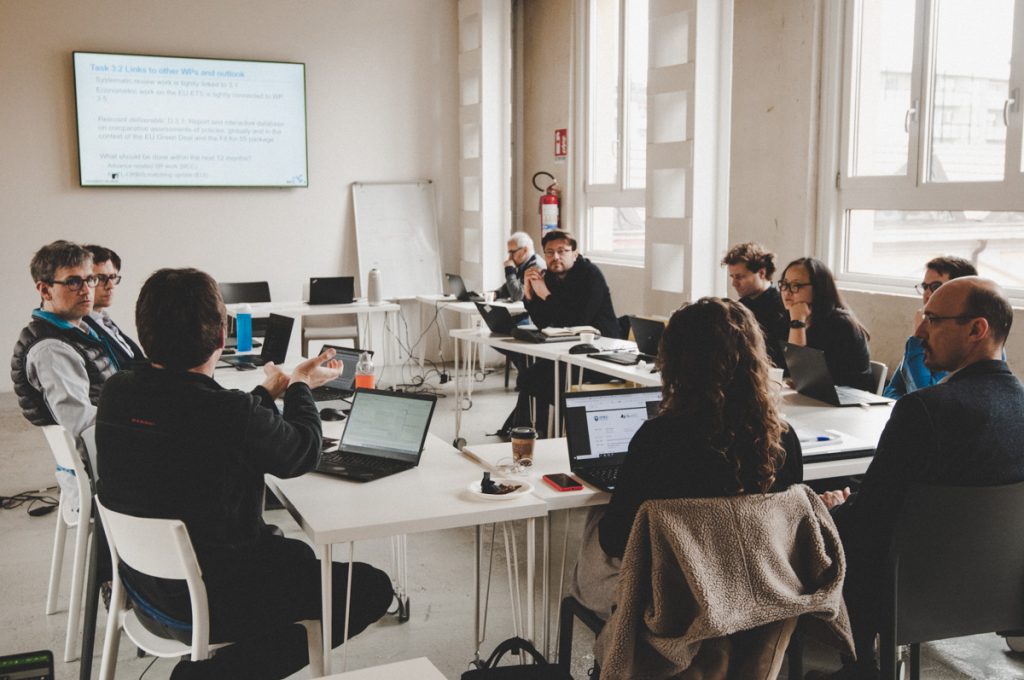INSIGHTS ON climate POLICY ACCEPTANCE
Notes of the discussions held during the 1st CAPABLE POLICY WORKSHOP on March 2nd 2023 at RFF‐CMCC European Institute on Economics and the Environment, CMCC c/o Cariplo Factory, Learning Rooms, Via Tortona 56, 20143 Milan. Participants included the following organizations: ETH, EUI, Deloitte, ènostra coop, FEEM, TEPSA, ECCO Think Tank, Next Energy Consumer, E6, RFF‐CMCC, MCC, Fraunhofer ISI, DG R&I, JRC, DG ENER, DG CLIMA, CEPS, European Parliament, Eurocities, EEA, CNRS – IESEG, OECD, PIK, EIB, ARERA, UC Santa Barbara, Enel Foundation, UAB, Italian Ministry of Environment/Sogesid, Università di Brescia, RIE, INFRAS, FernUniversität in Hagen, Carbon Market Watch.
carbon taxes may not be feasible right now but will become viable in the future
The discussion focused on which policy instruments should be prioritised in implementing the EU Green Deal. There was an agreement that carbon taxes and taxes, in general, are not feasible right now but may become viable in the future with proper revenue recycling towards clean infrastructure, investment or social redistribution.
There was also discussion about the effectiveness of different instruments, such as emissions trading systems, subsidies, and financial instruments, whereby it was noted that the public often misunderstands them. Is there a limit to their acceptability? The project would benefit from deeper reflection on public consensus.
need to focus on policy design, interconnectedness & policy packages, not only on single policy instruments
While participants stressed the need to avoid losing people and companies in technicalities, ensuring that policy instruments are justified and understood with thorough explanations and rationales was highlighted as essential. There are visible instruments, such as taxes, and invisible ones, such as ETS. Some subsidies are even nefast. Communication and transparency were emphasised as important aspects of policy design and implementation. To illustrate, it was noted that people are often more open to eliminating harmful subsidies as opposed to adding taxes.
In view of this, discussions echoed the need to focus on policy design, interconnectedness (e.g., policy mix, overlap of policies, different levels of governance) and policy packages, and not only on single policy instruments. Drawing on the fact that there are over 1.000 policies in the OECD, participants cautioned that their excessive number renders harmonisation challenging. Needless to say, the introduction of new policies can be costly too.
There was also a call for policy review based on successful experiences, ex‐post analysis, and consideration of financial instruments and schemes. The EU should lead by example, and reviewing these policies was broadly welcomed by participants.
Other policies linked to climate issues, such as human rights and corporate responsibility, were also mentioned. Identifying synergies between climate and biodiversity, environmental protection, agriculture, food, and transport policies would also add value.

Another question examined was how to increase the distributional fairness of the low‐carbon transition so as to boost support for climate policies. One approach is to sacrifice tax efficiency in exchange for acceptability, as targeting individuals efficiently is not always possible, and regressive impacts must be avoided. The term “distributional fairness” can be misleading, as it encompasses different dimensions, such as energy or food poverty. Adequate communication of the benefits linked to the tax whilst also “making it concrete” for the public by providing a yearly cheque, for instance, can further increase acceptability. Cultural backgrounds can also affect acceptability. The cost to act is often considered too high: policymakers should therefore focus on removing the barriers and incentivising new behaviours. Subsidies are becoming more relevant, and their distributional implications need to be considered. The political environment can remove barriers to adoption, and incentives must be provided to remove behavioural costs. According to some participants, carbon prices are mostly borne by consumers, while the industry escapes them through free allocation of emissions allowances. Current market designs, such as in the energy sector, must be reconsidered to address new objectives, and EU policymakers must tackle distributional consequences to avoid resentment towards policies.
Develop a feeling of ownership and a communal project, while addressing the common fear of change
The discussion finally revolved around the EU Climate Pact, Citizen Climate Assemblies, and EU Public Consultations and whether they can be considered citizen‐centric. The participants discussed the importance of citizen involvement in the policy‐making process. The issue of public acceptance of policies and the challenge of addressing the concerns of communities that would suffer if not supported was also discussed. The need to develop a feeling of ownership and a communal project was emphasised, along with the importance of addressing the fear of change by means of communicating how transformation can be better for everyone. The participants acknowledged that participation does not necessarily mean fairness and that delegation and representation can be a good approach. Overall, the discussion highlighted the need for tailored and practical approaches to public engagement and the importance of addressing the concerns of all stakeholders in the policy‐making process to ensure successful outcomes.



